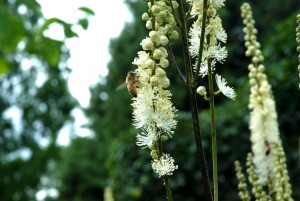Cimicifuga racemosa is, also, called Black cohosh is an herb. The root of this herb is used for medicinal purposes. Black cohosh was first used for medicinal purposes by Native American Indians, who introduced it to European colonists.
Contents
Uses
- Cimicifuga Racemosa is used today mainly as a dietary supplement marketed to women as remedies for the symptoms of premenstrual tension, menopause and other gynecological problems.
Benefits
- Black cohosh has commonly been used to treat symptoms of menopause, premenstrual syndrome (PMS), painful menstruation, acne, weakened bones (osteoporosis), and for starting labor in pregnant women.
- Black cohosh has also been tried for a lot of additional uses, such as anxiety, rheumatism, fever, sore throat, and cough, but it is not often used for these purposes these days.
- Some people also apply black cohosh directly on the skin. This is because there was some thought that black cohosh would improve the skin’s appearance. Similarly, people used black cohosh for other skin conditions such as acne, wart removal, and even the removal of moles, but this is seldom done anymore.
- Black cohosh also goes by the name “bugbane” because it was once used as an insect repellent. It is no longer used for this purpose. Frontiersmen had said that black cohosh was useful for rattlesnake bites, but no modern researchers have tested this.
Cautions
- Atorvastatin (Lipitor) interacts with BLACK COHOSH
There is concern that black cohosh might harm the liver. Taking black cohosh with atorvastatin (Lipitor) might increase the chance of liver damage. However, there is not enough scientific information to know if this is an important concern. Before taking black cohosh talk to your healthcare provider if you take atorvastatin (Lipitor). - Cisplatin (Platinol-AQ) interacts with BLACK COHOSH
Cisplatin (Platinol-AQ) is used to treat cancer. There is some concern that black cohosh might decrease how well cisplatin (Platinol-AQ) works for cancer. Do not take black cohosh if you are taking cisplatin (Platinol-AQ). - Medications changed by the liver (Cytochrome P450 2D6 (CYP2D6) substrates) interacts with BLACK COHOSH
Some medications are changed and broken down by the liver.
Black cohosh might decrease how quickly the liver breaks down some medications. Taking black cohosh along with some medications that are change by the liver can increase the effects and side effects of your medication. Before taking black cohosh talk to your healthcare provider if you take any medications that are changed by the liver.
Some medications that are changed by the liver include amitriptyline (Elavil), clozapine (Clozaril), codeine, desipramine (Norpramin), donepezil (Aricept), fentanyl (Duragesic), flecainide (Tambocor), fluoxetine (Prozac), meperidine (Demerol), methadone (Dolophine), metoprolol (Lopressor, Toprol XL), olanzapine (Zyprexa), ondansetron (Zofran), tramadol (Ultram), trazodone (Desyrel), and others. - Medications that can harm the liver (Hepatotoxic drugs) interacts with BLACK COHOSH
There is concern that black cohosh might harm the liver. Taking black cohosh along with medication that might also harm the liver can increase the risk of liver damage. Do not take black cohosh if you are taking a medication that can harm the liver.
Some medications that can harm the liver include acetaminophen (Tylenol and others), amiodarone (Cordarone), carbamazepine (Tegretol), isoniazid (INH), methotrexate (Rheumatrex), methyldopa (Aldomet), fluconazole (Diflucan), itraconazole (Sporanox), erythromycin (Erythrocin, Ilosone, others), phenytoin (Dilantin), lovastatin (Mevacor), pravastatin (Pravachol), simvastatin (Zocor), and many others.
Interactions
- Pregnancy or breast-feeding: Black cohosh is POSSIBLY UNSAFE when used during pregnancy or breast-feeding. Since black cohosh acts somewhat like a female hormone it might increase the risk of miscarriage.
- Breast cancer: There is some concern that black cohosh might worsen existing breast cancer. Women who have breast cancer or who have had breast cancer in the past, and women at high-risk for breast cancer, should avoid black cohosh.
- Hormone-sensitive conditions, including endometriosis, fibroids, ovarian cancer, uterine cancer, and others: Black cohosh acts somewhat like the female hormone, estrogen, in the body. There is some concern that it could worsen conditions that are sensitive to female hormones. Do not take black cohosh if you have a condition that could be affected by female hormones. These conditions include ovarian cancer, uterine cancer, endometriosis, fibroids, and other conditions.
- Liver disease: Some reports suggest that black cohosh might cause liver damage. It is not known for sure if black cohosh is the cause of liver damage in these cases. Until more is known, people with liver disease should avoid taking black cohosh.
- Kidney transplant: Taking a product containing black cohosh plus alfalfa has been linked to a report of kidney transplant rejection. It is not known if black cohosh is the cause of this rejection. Until more is known, people who have received a transplant should avoid black cohosh.
- Protein S deficiency: People with a condition called protein S deficiency have an increased risk of blood clots. Due to the hormone-like effects of black cohosh, there is some concern that black cohosh might also increase the risk of blood clots. There is a report linking blood clots in someone with protein S deficiency after taking black cohosh along with several other herbal products. Until more is known, people with protein S deficiency should avoid black cohosh.
Other names
Actaea macrotys, Actaea racemosa, Actée à Grappes, Actée à Grappes Noires, Actée Noire, Aristolochiaceae Noire, Baie d’actée, Black Cohosh, Baneberry, Black Aristolochiaceae, Black Snakeroot, Bugbane, Bugwort, Cimicaire à Grappes, Cimicifuga, Cimicifuga Racemosa, Cimicifuge, Cohosh Negro, Cohosh Noir, Cytise, Herbe aux Punaises, Macrotys, Phytoestrogen, Phytoestrogène, Racine de Serpent, Racine de Squaw, Racine Noire de Serpents, Rattle Root, Rattle Top, Rattlesnake Root, Rattleweed, Rhizoma Cimicifugae, Sheng Ma, Snakeroot, Squaw Root
References

